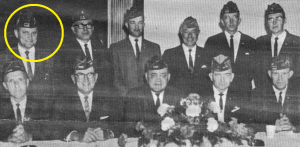 The 20-story James H. “Sloppy” Floyd Veterans Memorial Building (or “Sloppy Floyd Building” for short), named for State Representative James Floyd, houses various government agencies and divisions, is the central work location for thousands of Georgia’s state employees.
The 20-story James H. “Sloppy” Floyd Veterans Memorial Building (or “Sloppy Floyd Building” for short), named for State Representative James Floyd, houses various government agencies and divisions, is the central work location for thousands of Georgia’s state employees.
Many of the area’s commuters unknowingly pass through the building daily, as it is directly connected to the Georgia State Station on MARTA’s east/west rail line. Adjacent to Georgia’s State Capitol Building, the “Sloppy” Floyd Building and the man for whom the structure is named have a unique history.
In the 1970’s, the Georgia Building Authority allowed the state to begin construction on various new buildings. The Sloppy Floyd Building was one of these, planned as part of a new 10-square block State Capitol Complex. While originally deemed only a small part of the complex, the Sloppy Floyd Building opened in 1980 and was ultimately the only structure built completely.
With 800,000 square feet of rentable space, the Sloppy Floyd Building (also sometimes referred to as the “Twin Towers”) is part of a large cluster of tall buildings situated in downtown Atlanta. Though the brick building’s 1970’s architecture is juxtaposed by the constantly developing high-rises of the city, it features several modern amenities, including: a large connected parking deck with covered bridge walk-through; a large cafeteria called the “Capitol Commons” – complete with a Starbucks, Chick-fil-A, Barberitos, Quiznos and more; and direct connections to MARTA’s rail and bus services.
The building’s namesake, James Floyd, was a native of Chattooga County in north Georgia. While in high school in the early 1930’s, James was described by coaches as an unusually thin football player whose over-sized football jersey was constantly flopping around his gangly frame. So, coaches began referring to him as “Sloppy.” Unexpectedly, the nickname stuck with Floyd for the rest of his life.
 Floyd enlisted as an Army private in 1941, serving in the Pacific Theater during World War II and served until he was discharged as a major in 1946. He later rose to serve as the Adjutant Quartermaster of Georgia’s Veterans of Foreign Wars.
Floyd enlisted as an Army private in 1941, serving in the Pacific Theater during World War II and served until he was discharged as a major in 1946. He later rose to serve as the Adjutant Quartermaster of Georgia’s Veterans of Foreign Wars.
Floyd would go on to represent Chattooga County in Georgia’s House of Representatives for 22 years, where he became chairman of the Georgia Appropriations Committee and developed a strong authority over the state budget. Floyd served in the House of Representatives from 1953 until his death, cause by a sudden heart attack, in 1974.
He was as central a figure in the state legislature during his time, one might say, as the Sloppy Floyd Towers are to state government, today.
For more pictures, check out DOAS’ Facebook photo album!







